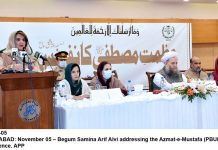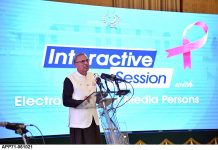Ministry of Human Rights (MoHR)
has taken several initiatives in order to ensure effective implementation of the historical legislation “The Trans
gender Act 2018”.
According to official data a
vailable with APP, the Trans
gender Act 2018 explicitly bans any discrimination against trans
gender citizens of Pakistan by employers, organizations, educational institutions, healthcare providers, transportation service providers and any private business or service provider.
Under the obligations of government, it also calls for the establishment of government-run protection centers for trans
gender citizens who feel at risk of harm.
It further guarantees trans
gender citizens their right to inheritance – often disputed under some interpretations of Islamic law – to run for public office, to assembly, to have access to public places and several other specific rights.
Trans
gender persons in Pakistan constitute one of the country’s most vulnerable and marginalized communities due to a multitude of inter-related socio-cultural, political, economic and legal hurdles.
In May 2018, the government passed an unprecedented and historic legislation – The Trans
gender Persons (Protection of Rights) Act, 2018 -wi
th the aim of advancing and mainstreaming the constitutional rights of trans
gender persons.
The legislation itself is wide ranging and encapsulates the right to identity, inheritance, health, education, employment and access to public places.
The Federal Ministry of Human Rights (MoHR), which was a participant in the consultative process to bring about the aforementioned Act, has been delegated the responsibility for its effective implementation by the Parliament.
To achieve this goal, MoHR has not only conducted consultations and meetings with trans
gender rights activists and civil society organizations but has also established the National Implementation Committee on trans
gender persons which consists of a trans
gender focal person from each province.
MoHR has also appointed a Trans
gender Expert from the community itself, who serves as the coordinator of the said committee.
These initiatives taken by MoHR are setting examples for others to follow in order to promote and mainstream trans
gender rights. List of Activities National Implementation Committee MOHR has constituted a National Implementation Committee which comprises of 13 members wi
th the Secretary MOHR as its Chairperson for the effective implementation of the Trans
gender Persons (Protection of Rights) Act, 2018.
The MOHR has also appointed a Trans
gender Person, Reem Sharif, to work as the Trans
gender Rights Expert and to serve as the coordinator of the said National Committee.
“After my appointment, I have developed a coordination mechanism 1 Article 25, The Constitution of the Islamic Republic of Pakistan, 1973 and TORs for this committee. We have also conducted several meetings and consultations wi
th the committee members,” trans
gender said.
Trans
gender Protection Center (TPC) conducted two consultations with all of the relevant stakeholders (trans
gender community members, government institutions and civil society) to develop coordination/referral Mechanism and prepared Terms of Ref
erence (TORs) for the TPC, drafted police guidelines with ref
erence to international precedent, conducted police sensitization session and consultation on the drafted Guidelines with Islamabad and Rawalpindi Police.
The ministry has developed coordination mechanism for all of the five community leaders who are members of the National Implementation Committee.
Awareness sessions were also conducted at universities and other public platforms. Separate wards have been established in PIMS hospital for Trans
gender citizens.












